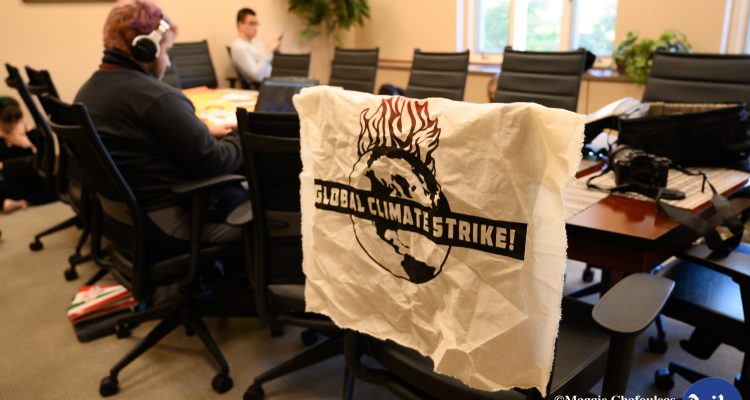By Grace Mcfadden
On Friday, Oct. 18, UConn Fridays for Future held their fourth sit-in in President Thomas Katsouleas’s office. The climate justice group expressed intention to hold weekly sit-ins until their demands are met, and has held strong to that commitment since the initial climate strike on Sept. 20.
Fridays for Future is an international movement started by Swedish climate activist Greta Thunberg. The Sept. 20 climate strike at UConn was part of a week of climate protests and strikes occurring worldwide catalyzed by Fridays for Future. The UConn branch of Fridays for Future outlined seven demands for the university administration, from officially declaring a climate emergency to divesting the UConn Foundation of fossil fuel holdings.
Despite now entering their fifth week of protests, students are still voicing their support for the cause. Mateo Escobar, seventh semester biomedical engineering and materials science engineering major, expressed his enthusiasm for Fridays for Future’s continued efforts at last Friday’s sit-in.
“The fact that they were a mass movement on campus that actually got a major strike done in a few weeks was pretty inspiring.”
Of the seven demands, Escobar said the seventh one resonated most with him.
“It’s really important because environmentalism has generally been a majority white, majority male area. I think that’s led to policies that are really hurtful towards working class people and women and people of color in general. It’s just because those voices haven’t been heard really.”

Liz Gonzalez, a masters student in the international studies program at El Instituto, also identified strongly with the seventh demand.
“The most marginalized communities are the ones that feel the impacts of climate change first and the most,” said Gonzalez. “Intersectionality and climate change are intrinsically intertwined. You can’t fully achieve climate justice without including everyone that’s involved with it.”
Gonzalez began participating in the sit-ins because she said she felt like she “couldn’t not be a part of it.”
UConn Fridays for Future’s success can be attributed to their involvement beyond just the sit-ins. Beside the initial strike and sit-ins, the organization also mobilized their membership to attend a Board of Trustees meeting on Wednesday, October 23. Fifth semester political science major and lead organizer for Fridays for Future Harry Zehner said the main goal of attending the meeting was to make their voices heard.
“We wanted to show our presence there, and demonstrate to the university again–as has been kind of the point of the sit-ins so far–that we’re still present, we still care about these issues, and we’re not going away. The other purpose is that there’s a public comments period,” said Zehner. “One of our members actually did make a public comment in the earlier session at the Board of Trustees, specifically about the natural gas plant and the committee that the president is forming that’s going to be composed of students and faculty.”
“We were happy that we got people out there. Any support that’s there is good,” he said of the meeting.
Fridays for Future’s influence has already gone beyond just UConn. Anna Dietz, a freshman at E. O. Smith High School, attended the sit-in last Friday with hopes of bringing something similar to her school.
“There was a day when Greta Thunberg was doing a walkout, and the high school didn’t do it. They didn’t participate. I thought that should definitely be a thing that the high school should do. Or, at least allow their students not to get in trouble for it or something, but they didn’t.”
“That inspired me to find out if I could make it happen at my high school, and see what this was like, so I could base it on that.”


